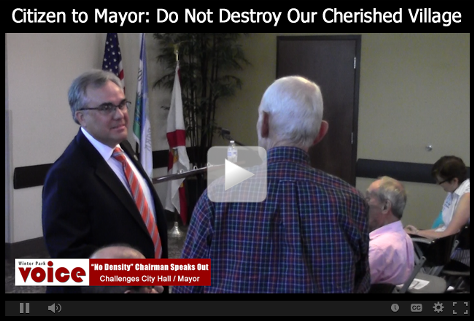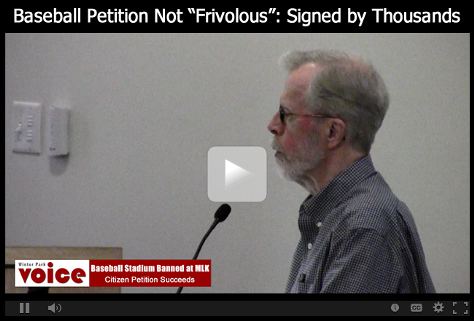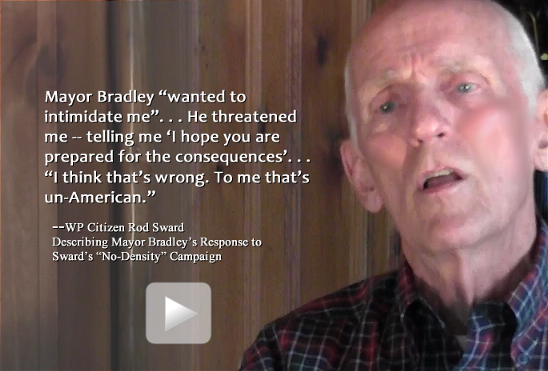|
Even in the dog days of summer, Winter Park citizens are making a lot of noise, and the city is beginning to hear them.
While one Political Action Committee (PAC), “Protect MLK, Jr. Park,” was circulating a petition for an ordinance to prevent building a baseball stadium in Martin Luther King, Jr., Park, a second PAC, “Citizens for Managed Growth,” was formed to distribute the yellow “No Density” signs that currently dot the lawns of homes throughout Winter Park.
Chaired by Roderick Sward, Citizens for Managed Growth was formed in response to the June 9 commission vote to amend the Comprehensive Plan to allow increased density and intensity of development.
PAC Chairman Blindsided at Mayor’s Coffee Talk
On Friday morning, July 11, at the mayor’s coffee talk at the Chamber of Commerce, Sward was caught off guard by Winter Park Hospital CEO Mayor Kenneth Bradley when Bradley unexpectedly handed him the microphone and asked him to explain the purpose of Citizens for Managed Growth.
Sward stood and articulated the concerns of Winter Parkers that the proposed changes to the Comp Plan would drastically alter the village character of Winter Park. He stated that the citizens felt they were not being heard by the city and had formed a PAC to publicly air their views by placing “No Density” signs around the city.
The following Monday, July 14, the commission convened to consider, among other things, the final reading of the ordinance to prevent a Minor League baseball stadium from being built in Martin Luther King, Jr. Park.
Mayor’s Amendment Fails to Force a Referendum
The ordinance had some rough early innings, as an essential paragraph had been accidentally omitted by the City Attorney’s office. Assistant City Attorney William E. Reischmann corrected the error, however, and the ordinance in its original form came up for discussion and a final vote.
Insisting that Martin Luther King, Jr. Park had never been seriously considered as a stadium venue, Mayor Bradley proposed a minor amendment to the effect that the measure would become an ordinance “if the city decided to build a baseball stadium.” This action could have forced the ordinance onto the ballot as a referendum.
Rebutting the mayor’s dismissal of MLK Park as a serious possibility for the baseball stadium, PAC Chairman Gene Randall pointed out that MLK was very much in the running as a site for the stadium until the formation of the PAC, when it suddenly dropped to the bottom of the list. “This wasn’t a frivolous ordinance at the time we formed the PAC,” said Randall. (Video 16:22)
Bradley Confronts Citizen PAC Chairman in Audience
As the issue finally came to a vote, Bradley’s amendment failed and the commission voted unanimously to pass the ordinance as it was brought by the citizens to the city. Bradley then called a recess.
With MLK Park now safe from the baseball stadium, the crowd of citizens milled around the ante chambers, turning their attention to the proposed changes to the Comp Plan. Mayor Bradley emerged from the chambers and approached Rod Sward, interrupting Sward’s conversation. Bradley demanded to know who had contacted him to form the Citizens for Managed Growth PAC. When Sward declined to answer, Bradley admonished him to be “ready for the consequences.” In a subsequent interview with the Voice, Sward described his encounter with the mayor. Mayor Bradley did not respond to the Voice’s request for comment.
Comp Plan Amendment Due Back Any Day
When asked if they had received approval for the proposed Comp Plan amendment that was sent to Tallahassee in mid-June — the subject of Citizens for Managed Growth and their “No Density” signs — City Planning Manager Jeff Briggs responded that staff had not yet received it, but that they expected it any day. “However,” said Briggs, “staff is now working on visioning . . . The amendment does not have to be considered now.”
Briggs was referring to the fact that the commission has 180 days, or six months, in which to act on the proposed amendment once it is approved in Tallahassee. If they fail to act within that time, the amendment simply dies.
Will the amendment be part of the larger vision?
As to the probable disposition of the amendment, several possibilities exist, though no one claims to know what will happen. The commission could bring it up for a vote as soon as they receive it from Tallahassee. They could wait for five to six months before they act. They could consider the amendment within the context of the visioning process and let the results of that process guide their decision. Or, they could decide to reframe the amendment to conform with the final results of the visioning process.
Mayor Flips a U-Turn on Visioning
What seems to be driving city staff’s attention away from Comp Plan amendments and focusing their efforts instead on visioning has to do with Mayor Bradley’s own vision of the visioning process. Bradley has gone from resisting a visioning effort involving “the same 24 angry citizens” to moving full bore toward what he terms a “scientific” visioning process to determine the future direction of the city.
City Staff Works to Structure the Process
Asked whether the city has identified a consultant to guide the visioning process, Briggs said they had not. He explained that there is much work to be done before anyone knows what form the visioning process will take. Choosing a consultant “is not like bidding out tires,” said Briggs. Staff will need further direction from the commission regarding the choice of a consultant, how the surveys will be conducted and the overall budget parameters.
Citizen Voices Equal in Weight to Voices of Advisory Boards
Communications Director Clarissa Howard confirmed that the planning staff is working hard to structure the visioning process. She said that the visioning would not result in a new Comprehensive Plan, as had been previously suggested, but that the results would be used to review the current plan.
She confirmed that City Advisory Boards would have an active role in the visioning process, but said, “The voices of the citizens will be equal in weight to the voices of the [ advisory ] board members. Outreach is very important to city staff.” |




Recent Comments